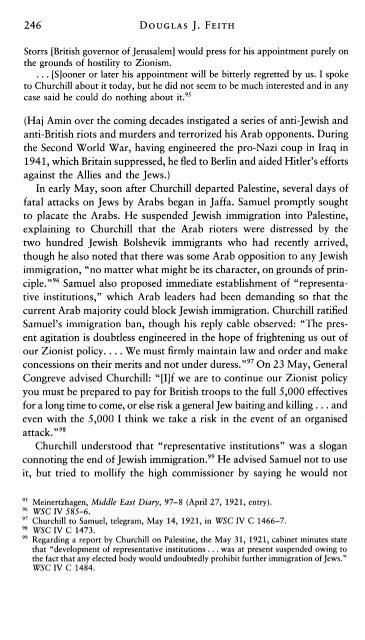Churchill, Palestine and Zionism, 1904-1922 - Douglas J. Feith
Churchill, Palestine and Zionism, 1904-1922 - Douglas J. Feith
Churchill, Palestine and Zionism, 1904-1922 - Douglas J. Feith
Create successful ePaper yourself
Turn your PDF publications into a flip-book with our unique Google optimized e-Paper software.
246 DOUGLAS J. FEITH<br />
Storrs [British governor of Jerusalem] would press for his appointment purely on<br />
the grounds of hostility to <strong>Zionism</strong> .<br />
. . . [S]ooner or later his appointment will be bitterly regretted by us. I spoke<br />
to <strong>Churchill</strong> about it today, but he did not seem to be much interested <strong>and</strong> in any<br />
case said he could do nothing about it.95<br />
(Haj Amin over the coming decades instigated a series of anti-Jewish <strong>and</strong><br />
anti-British riots <strong>and</strong> murders <strong>and</strong> terrorized his Arab opponents. During<br />
the Second World War, having engineered the pro-Nazi coup in Iraq in<br />
1941, which Britain suppressed, he fled to Berlin <strong>and</strong> aided Hitler's efforts<br />
against the Allies <strong>and</strong> the Jews.)<br />
In early May, soon after <strong>Churchill</strong> departed <strong>Palestine</strong>, several days of<br />
fatal attacks on Jews by Arabs began in Jaffa. Samuel promptly sought<br />
to placate the Arabs. He suspended Jewish immigration into <strong>Palestine</strong>,<br />
explaining to <strong>Churchill</strong> that the Arab rioters were distressed by the<br />
two hundred Jewish Bolshevik immigrants who had recently arrived,<br />
though he also noted that there was some Arab opposition to any Jewish<br />
immigration, "no matter what might be its character, on grounds of principle.,,96<br />
Samuel also proposed immediate establishment of "representative<br />
institutions," which Arab leaders had been dem<strong>and</strong>ing so that the<br />
current Arab majority could block Jewish immigration. <strong>Churchill</strong> ratified<br />
Samuel's immigration ban, though his reply cable observed: "The present<br />
agitation is doubtless engineered in the hope of frightening us out of<br />
our Zionist policy .... We must firmly maintain law <strong>and</strong> order <strong>and</strong> make<br />
concessions on their merits <strong>and</strong> not under duress.,,97 On 23 May, General<br />
Congreve advised <strong>Churchill</strong>: "[I]f we are to continue our Zionist policy<br />
you must be prepared to pay for British troops to the full 5,000 effectives<br />
for a long time to come, or else risk a general Jew baiting <strong>and</strong> killing ... <strong>and</strong><br />
even with the 5,000 I think we take a risk in the event of an organised<br />
attack.,,98<br />
<strong>Churchill</strong> understood that "representative institutions" was a slogan<br />
connoting the end of Jewish immigration. 99 (Haj Amin over the coming decades instigated a series of anti-Jewish <strong>and</strong><br />
anti-British riots <strong>and</strong> murders <strong>and</strong> terrorized his Arab opponents. During<br />
the Second World War, having engineered the pro-Nazi coup in Iraq in<br />
1941, which Britain suppressed, he fled to Berlin <strong>and</strong> aided Hitler's efforts<br />
against the Allies <strong>and</strong> the Jews.)<br />
In early May, soon after <strong>Churchill</strong> departed <strong>Palestine</strong>, several days of<br />
fatal attacks on Jews by Arabs began in Jaffa. Samuel promptly sought<br />
to placate the Arabs. He suspended Jewish immigration into <strong>Palestine</strong>,<br />
explaining to <strong>Churchill</strong> that the Arab rioters were distressed by the<br />
two hundred Jewish Bolshevik immigrants who had recently arrived,<br />
though he also noted that there was some Arab opposition to any Jewish<br />
immigration, "no matter what might be its character, on grounds of principle.,,96<br />
Samuel also proposed immediate establishment of "representative<br />
institutions," which Arab leaders had been dem<strong>and</strong>ing so that the<br />
current Arab majority could block Jewish immigration. <strong>Churchill</strong> ratified<br />
Samuel's immigration ban, though his reply cable observed: "The present<br />
agitation is doubtless engineered in the hope of frightening us out of<br />
our Zionist policy .... We must firmly maintain law <strong>and</strong> order <strong>and</strong> make<br />
concessions on their merits <strong>and</strong> not under duress.,,97 On 23 May, General<br />
Congreve advised <strong>Churchill</strong>: "[I]f we are to continue our Zionist policy<br />
you must be prepared to pay for British troops to the full 5,000 effectives<br />
for a long time to come, or else risk a general Jew baiting <strong>and</strong> killing ... <strong>and</strong><br />
even with the 5,000 I think we take a risk in the event of an organised<br />
attack.,,98<br />
<strong>Churchill</strong> understood that "representative institutions" was a slogan<br />
connoting the end of Jewish immigration. He advised Samuel not to use<br />
it, but tried to mollify the high commissioner by saying he would not<br />
99 He advised Samuel not to use<br />
it, but tried to mollify the high commissioner by saying he would not<br />
95 Meinertzhagen, Middle East Diary, 97-8 (April 27, 1921, entry).<br />
96 WSC IV 585-6.<br />
97 <strong>Churchill</strong> to Samuel, telegram, May 14, 1921, in WSC IV C 1466-7.<br />
98 WSC IV C 1473.<br />
99 Regarding a report by <strong>Churchill</strong> on <strong>Palestine</strong>, the May 31, 1921, cabinet minutes state<br />
that "development of representative institutions ... was at present suspended owing to<br />
the fact that any elected body would undoubtedly prohibit further immigration of Jews."<br />
WSC IV C 1484.


